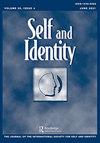Making America great for whom?: How Trump’s Presidency affected fit and national identity among targets of bias
IF 2.1
4区 心理学
Q3 PSYCHOLOGY, SOCIAL
引用次数: 2
Abstract
ABSTRACT Can a politician cue national identity and fit? Given that Trump’s rhetoric often signaled the devaluation of certain groups, we examined this across three pre-registered studies . In Study1 (2017), targets of Trump’s rhetoric reported less social fit, greater social identity threat, and expected increased discrimination . In Study2 (2017), marginalized targets reported less fit and American identification as well as greater threat and discrimination when anticipating Trump(vs. Obama). Study3, conducted during the 2020 election, revealed that racialized participants felt greater fit and American identification after (vs. before) Biden’s victory , but effects of Trump’s presidency on expected discrimination had not reversed. These findings suggest that a divisive leader can induce feelings of devaluation, threat, and national detachment.让美国为谁而伟大?:特朗普的总统任期如何影响偏见目标中的健康和国家认同
摘要:政治家能否暗示民族认同和契合?鉴于特朗普的言论经常预示着某些群体的贬值,我们在三项预先注册的研究中对此进行了研究。在Study1(2017)中,特朗普言论的目标报告称,社会适应度较低,社会身份威胁较大,预计歧视会增加。在Study2(2017)中,边缘化目标报告称,在预测特朗普(与奥巴马)时,不太适合和认同美国人,以及更大的威胁和歧视。2020年大选期间进行的研究3显示,在拜登获胜后(与之前相比),种族化的参与者感觉更适合和认同美国人,但特朗普总统任期对预期歧视的影响并没有逆转。这些发现表明,一个分裂的领导人会引发贬值、威胁和国家超然的感觉。
本文章由计算机程序翻译,如有差异,请以英文原文为准。
求助全文
约1分钟内获得全文
求助全文
来源期刊

Self and Identity
PSYCHOLOGY, SOCIAL-
CiteScore
5.10
自引率
5.00%
发文量
26
期刊介绍:
Work on self and identity has a special place in the study of human nature, as self-concerns are arguably at the center of individuals" striving for well-being and for making sense of one"s life. Life goals develop and are influenced by one"s view of what one is like, the way one would ideally like to be (or would like to avoid being), as well as one"s perceptions of what is feasible. Furthermore, conceptions of self and the world affect how one"s progress towards these goals is monitored, evaluated, redirected, re-evaluated, and pursued again. Thus, the “self” as a construct has far-reaching implications for behavior, self-esteem, motivation, experience of emotions and the world more broadly, and hence for interpersonal relationships, society, and culture.
 求助内容:
求助内容: 应助结果提醒方式:
应助结果提醒方式:


